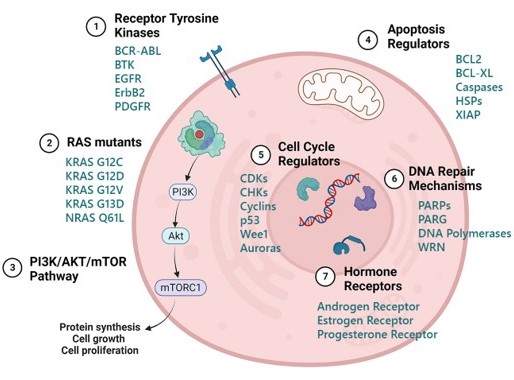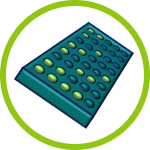Small Molecule Cancer Therapy Targets
For some cancers, small molecules that disrupt, inhibit, or agonize target protein function may be the best therapeutic option. Indeed, many new targeted therapeutics are now approved together with companion diagnostics to identify patient populations most likely to benefit from the new treatment.
For some cancers, small molecules that disrupt, inhibit, or agonize target protein function may be the best therapeutic option. Indeed, many new targeted therapeutics are now approved together with companion diagnostics to identify patient populations most likely to benefit from the new treatment.
Despite the successful emergence of immunotherapy and other biologics to fight cancer, some cancer targets remain elusive, where the only option may require the use of small molecule compounds for effective therapy. Small molecules play a crucial role in cancer therapy, offering targeted and systemic approaches to combat the complexities of cancer at the molecular level. These compounds, typically with low molecular weight, can penetrate cell membranes and interfere with specific signaling pathways or cellular processes involved in cancer development and progression. Because of the limitations of immune-mediated therapeutics, small molecules will continue to be critical for the future of cancer therapies.
A promising application of small molecules in cancer therapy involves targeted therapies, where drugs are designed to selectively inhibit specific molecules or pathways implicated in cancer growth. Tyrosine kinase inhibitors, for instance, interfere with signaling pathways involved in cell proliferation and angiogenesis, exhibiting enhanced precision and reduced systemic toxicity compared to traditional chemotherapy. Furthermore, recent developments in targeted protein degradation molecules such PROTACs, LyTACs, molecular glues and others have opened new possibilities to use the ubiquitin system or other protein degradation systems to remove cancer-driving proteins, both intracellular and membrane bound. This illustration depicts some of the major areas for small molecule therapeutics in cancer, many of which have approved drugs for the indicated targets.

Despite their potential, challenges persist in the development of small molecule cancer therapies, including drug resistance and the need for personalized treatment strategies. Nevertheless, ongoing research and advancements in drug design using AI or conventional screening are continually expanding the repertoire of small molecules, either as stand-alone or in combinations, offering new avenues for innovative and targeted cancer treatments with improved efficacy and reduced side effects.
Our solutions to drive small molecule drug discovery
Inhibitor Screening Assay Kits

- 600+ assays available
- Multiple formats including TR-FRET, chemiluminescent, fluorescence polarization, colorimetric and more
- View Products
Bioactive Recombinant Proteins

- Purified proteins ideal for binding assays, biochemical assays, or WB controls
- View Products
Inhibitors & Activators

- For use as positive controls in biochemical or cellular assays
- View Products
Reporter Cell Lines

- For cellular readouts of small molecule activity using luciferase or eGFP quantitation
- View Products
PROTAC Development and Optimization

- Optimization kits
- Linkers and ligands for PROTAC development
- View Products
Screening & Profiling Services
Inquiries
│Featured Products & Services
- PARP Screening & Profiling
- Kinase Products
- Epigenetic Products
- PROTAC Products
- KRAS Products
- DNA Damage & Repair Products
│Related Services
- Custom Biochemical Assay Development
- Biochemical Screening & Profiling
- Cell Signaling Pathway Screening & Profiling Services


